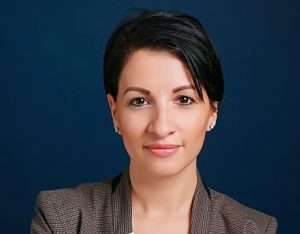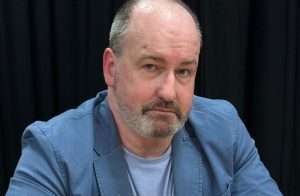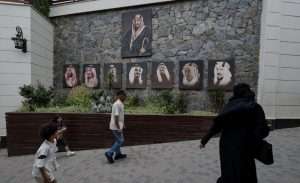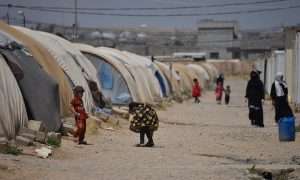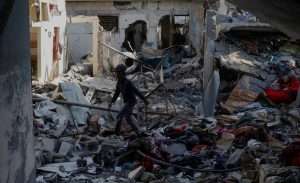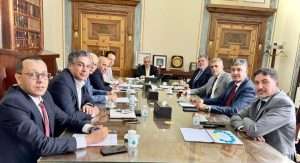David Teurtrie: Will Georgia and Moldova in EU anger Russia?

Georgians and Moldovans went to the polls in October for the first time since Brussels granted them official EU candidate status. Georgia’s were parliamentary elections, while Moldova chose a president and voted on constitutional change to enable EU integration.
Western politicians expected a landslide for pro-European parties, banking on Russia’s invasion of Ukraine alienating voters. But official results show 53% of Georgians supported the ruling party, dubbed pro-Russian by its opponents. And in Moldova, while pro-European president Maia Sandu secured over 54% of votes in the second round, the yes vote for constitutional change just scraped through, winning only 50.5%. Sandu’s supporters attributed these mixed results to Russian interference, a view echoed by Western governments and media.
But, although Moscow undoubtedly seeks to influence its neighbours, Europeans are mistaken if they think this is the sole cause.
Georgia (population 3.9 million) and Moldova (2.6 million) (1)have several features in common: both are small post-Soviet republics contending with pro-Russian separatism and significant emigration to Russia and Western Europe. After being long sidelined from European integration, they signed EU association agreements that came into effect in 2016 under the Eastern Partnership framework.
Contrary to Western assumptions, geopolitics does not dominate public opinion in Georgia and Moldova.
However, the two states also differ in significant ways. Endemic corruption in Moldova has caused multiple political-financial scandals. In 2015 three banks embezzled $1bn – 15% of the country’s GDP – with the complicity of some of the political elite. Recently, Interpol discovered its Moldovan branch was blocking the extradition of international criminals in return for bribes to senior officials (2). In contrast, Georgia implemented sweeping administrative reforms following its 2003 ‘rose revolution’. Transparency International ranks Georgia as the least corrupt post-Soviet republic outside the Baltic states, with a probity level higher than that of some EU members. The rule of law there was robust enough to earn it 49th place in the World Justice Project’s (WJP) rankings, well ahead of Moldova (68th) (3).
Yet the European Commission has looked much more favourably on Moldova’s candidacy. This October the EU sought to exert influence on both the Georgian and Moldovan elections (while condemning Russian interference), deploying both the carrot and the stick: the European Council effectively put Georgia’s accession process on hold, but just days before Moldova’s referendum, the Commission announced a $1.8bn investment plan for that country. Brussels appreciates Maia Sandu’s unwavering support for Ukraine but is critical of the Georgian government for its ambiguous stance on Russia since 2022.
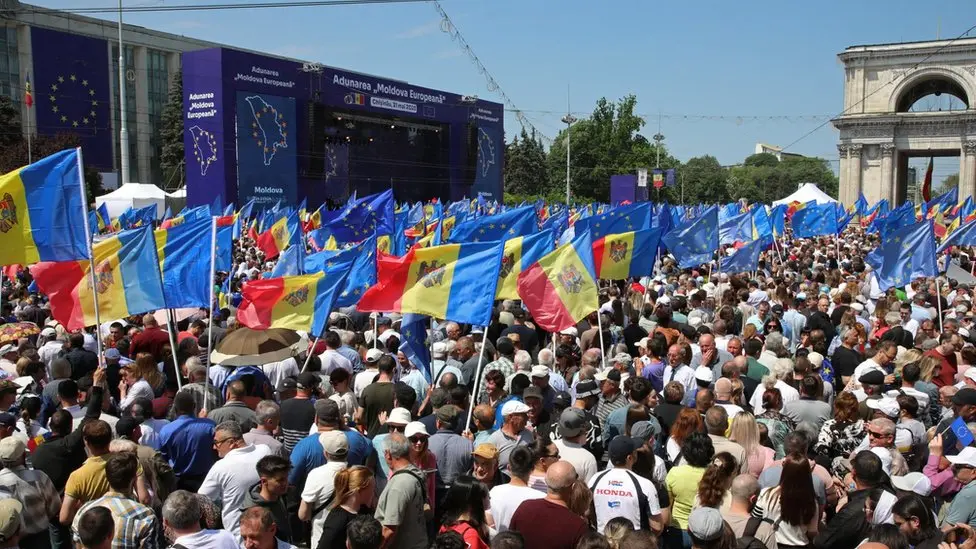
No sanctions on Russia
Georgia has refused to impose sanctions on Russia (while claiming to comply with Western ones), and some measures introduced by the ruling Georgian Dream party since 2012 have raised fears of a drift towards illiberalism. In May 2024 Georgia’s parliament passed a law requiring NGOs and media outlets which get over 20% of their funding from abroad to register as ‘organisations serving foreign interests’. The opposition, supported by Western governments, denounced this as authoritarian, comparing it to Russia’s 2012 ‘foreign agents’ law. The Georgian authorities – aligning with the influential Georgian Orthodox Church and conservative elements in society – further strained relations with the West by passing legislation in September 2024 that bans ‘propaganda for same-sex relations’ in schools and the media, putting them on a par with incest.
All this has strengthened the impression of a pro-Russian government whose election victory is due to authoritarian methods copied from its neighbour. Many opposition parties rejected the election results, and the Organisation for Security and Cooperation in Europe (OSCE) reported evidence of political tension and the ruling party abusing state resources. Yet, as political scientist Alexander Atasuntsev notes, ‘The OSCE reported violations, but recognised the results’ (4). Public protests against alleged fraud were relatively muted compared to past political crises.
What explains these developments, given that Georgia pivoted toward the West long ago and the vast majority of Georgians support Euro-Atlantic integration?
Georgian politics is deeply polarised. Georgian Dream, controlled by oligarch Bidzina Ivanishvili, stands in direct opposition to the United National Movement (UNM) led by Georgia’s former president Mikheil Saakashvili. He left office in 2013 and moved to Ukraine, where he embarked on a tumultuous political career before returning secretly to Georgia in October 2021. He then unsuccessfully called on his supporters to rise up, after which he was quickly arrested and imprisoned for abuse of power and corruption. This history is one key to understanding the current situation in Georgia: Ivanishvili fears that if the opposition comes to power, Saakashvili will be released and might seek revenge by locking him up.
The government, accusing Kyiv of supporting Saakashvili, claimed the opposition wanted a revolution that would lead to conflict with Russia. Prime minister Irakli Kobakhidze argued, ‘The main task driving these people is the Ukrainisation of Georgia – to make Georgia share the [fate of Ukraine]’ (5). Both sides tried to discredit the other: the opposition framed the election as a choice between democratic Europe and autocratic Russia, while the government portrayed itself as defending peace against a ‘war party’ that wanted to open a second front against Russia. The ruling party appears to have convinced more voters; post-election, the UNM is no longer even the main opposition force.
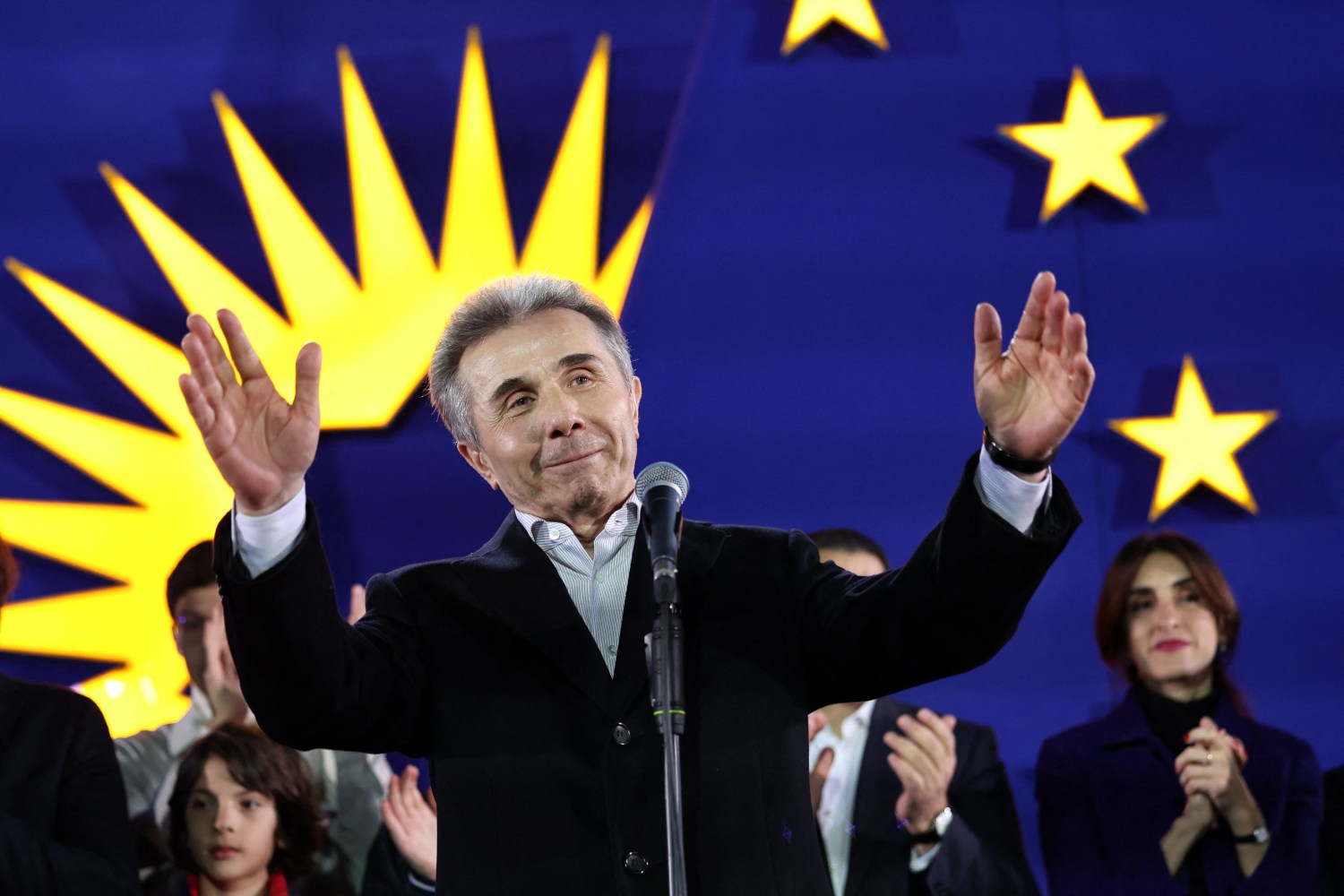
Contrary to Western assumptions, geopolitics does not dominate public opinion in Georgia and Moldova. According to surveys by the International Republican Institute, economic development, unemployment and reclaiming lost territories – notably South Ossetia and Abkhazia – are top priorities for Georgians, while compliance with EU association agreements comes sixth. Similarly, Moldovans are mainly concerned about the cost of living, corruption and low wages; the war ranks 16th among their concerns (6).
Contrasting economic performances
Analysts often overlook socioeconomic factors in these countries. Georgia’s government can point to strong annual economic growth of between 7% and 10% since 2021. Like Armenia, which has experienced similar growth despite military defeat by Azerbaijan, this performance stems partly from Russia’s reorientation of foreign trade to the benefit of the Caucasus and Central Asia. Conversely, Moldova has suffered as a result of economic and energy ties with Moscow being cut because of the war, and of the sanctions it has introduced, leading to a 5% GDP decline in 2022, stagnation in 2023 and slight recovery in 2024. In this context, many Moldovan voters wanted political change.
While association agreements with the EU mean these countries can take advantage of both European markets and trade with Russia, full membership would require imposing severe sanctions on Moscow, sacrificing the advantages of their current in-between status.
These socioeconomic factors in one of Europe’s poorest countries played as big a part as foreign interference. The Moldovan authorities accused Russia of vote-buying, but its impact remains unclear. Pro-European forces, which control all institutions, also engaged in questionable practices. As the OSCE noted, ‘The incumbent continued to benefit from the misuse of administrative resources … and from unbalanced media coverage’ (7). Despite such behaviour, Western governments offered their strong support. Kobakhidze called the ‘stark difference’ in treatment between Georgia and Moldova ‘a clear injustice’, stressing that Georgia was significantly ahead in terms of ‘the strength of institutions, lack of corruption, economic development, human rights, democracy, political pluralism, media pluralism’ (8).
Moldovan opposition parties have echoed Georgia’s complaints. The Socialist Party, which backed the main opposition candidate Alexandr Stoianoglo, has refused to recognise the official results, arguing that ‘the presidential election … cannot be considered a free and democratic expression of the people’ (9). They accused Sandu of being a ‘diaspora president’, as 51.5% of domestic voters supported Stoianoglo, compared to only 17% of Moldovan expatriates, whose votes flipped the outcome in Sandu’s favour.
READ: EU complicit in Tunisian sale of migrants to Libyan gangs
The integrity of the election was further undermined by a lack of polling stations in Transnistria and Russia, which, the opposition claim, deprived hundreds of thousands of citizens of their right to vote. Whereas there were 59 polling stations in Italy (home to the second-largest Moldovan diaspora community, with approximately 190,000 members), there were just two in Russia (compared to 17 in the past elections), despite Russia being home to the largest Moldovan diaspora, of nearly 300,000.
Elections in Georgia and Moldova don’t map well onto the binary narratives that Western elites like. In Eastern Europe, electoral outcomes reflect domestic dynamics as much as geopolitics. Furthermore, forces that opponents call ‘pro-Russian’ – who do not have a monopoly on electoral irregularities – are often a reflection of pragmatic attempts to navigate a complex regional environment rather than of a genuine love of Russia. While association agreements with the EU mean these countries can take advantage of both European markets and trade with Russia, full membership would require imposing severe sanctions on Moscow, sacrificing the advantages of their current in-between status. Brussels, however, seems unlikely to take seriously their rejection of such black-and-white thinking.
Want to chase the pulse of North Africa?
Subscribe to receive our FREE weekly PDF magazine




